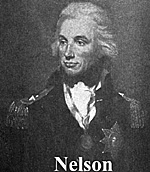Horatio Nelson became the most famous British naval officer of his day. Earning fame at the Battle of Cape Saint Vincent in February of 1797, he lost prestige as well as an arm attempting to take a Spanish treasure ship at Santa Cruz five months later. Looking
to restore his reputation, Nelson was given the task of intercepting Napoleon's expedition. After a frustrating two month chase, he caught the French in Aboukir Bay and won Britain's most spectacular naval victory since the Spanish Armada..
In 1798 this superiority over its opponents was not yet absolutely certain. After a frustrating chase, Rear Admiral Horatio Nelson cornered his quarry and delivered a devastating blow to General Bonaparte's plans for Egypt. The French never recovered from this catastrophe.
After the decision to invade Egypt had been made by the Directory, it was impossible to
keep secret the assembly of the huge armada of ships necessary to transport the large number of
troops, horses, and equipment. In fact, British Admiral John Jervis, commander in Mediterranean, was informed by the British consul in Livorno, Italy in April 1798 that the French had concentrated nearly 400 ships in the harbors of southern France and Italy; that merchant fleet, under the escort of ships of the line being readied for action, would soon be in a position to land 40,000 men in Sicily or Malta or even in Egypt. Despite such intelligence coups, the armada's final objective remained a mystery until it reached Egypt. The French fleet included 72 military vessels and left on the morning of 19 May, 1798. Vice Admiral
Franqois Paul Brueys was in command, flying his flag on the Orient.
Brueys had first gone to sea in 1766 at the age of 13. Promoted to captain in the French Royal Navy in 1792, he was arrested and cashiered for political reasons during the Revolution. He was later reinstated and became a vice admiral just before the armada sailed. The Egyptian expedition, his first major command, was the largest naval venture France had attempted since the war began in 1792. Despite the French success in assembling the armada, keeping its final destination a secret, and getting under sail with apparent ease, the expedition was running an enormous risk. If the British warships could catch the slow-moving, heavily-laden transports, French plans for the Mediterranean could have ended abruptly. Even if the expedition made it
to Egypt, keeping the army supplied and maintaining contact with France would become much more difficult once the British knew where "General Buonoparte" (as they derisively referred to him) had gone.
More Battle of the Nile 1798
 England earned a reputation for naval dominance during the Napoleonic Wars. However, before Brittania could rule the waves, it had to establish its supremacy at sea.
England earned a reputation for naval dominance during the Napoleonic Wars. However, before Brittania could rule the waves, it had to establish its supremacy at sea.
Battle of the Nile 1798: Introduction
Battle of the Nile 1798: French and British Navies
Battle of the Nile 1798: French Luck and British Pursuit
Battle of the Nile 1798: French Success and British Frustration
Battle of the Nile 1798: Battle of Aboukir Bay
Battle of the Nile 1798: British Campaign Medal
Battle of the Nile 1798: French and British Order of Battle
Battle of the Nile 1798: Large Voyage and Pursuit Maps (very slow: 386K)
Battle of the Nile 1798: Large Battle Maps (very slow: 336K)
Battle of the Nile 1798: Jumbo Battle Maps (extremely slow: 562K)
Back to Table of Contents -- Napoleon #13
Back to Napoleon List of Issues
Back to MagWeb Master Magazine List
© Copyright 1998 by Napoleon LLC.
This article appears in MagWeb (Magazine Web) on the Internet World Wide Web.
The full text and graphics from other military history magazines and gaming magazines are available at http://www.magweb.com
Order Napoleon magazine direct